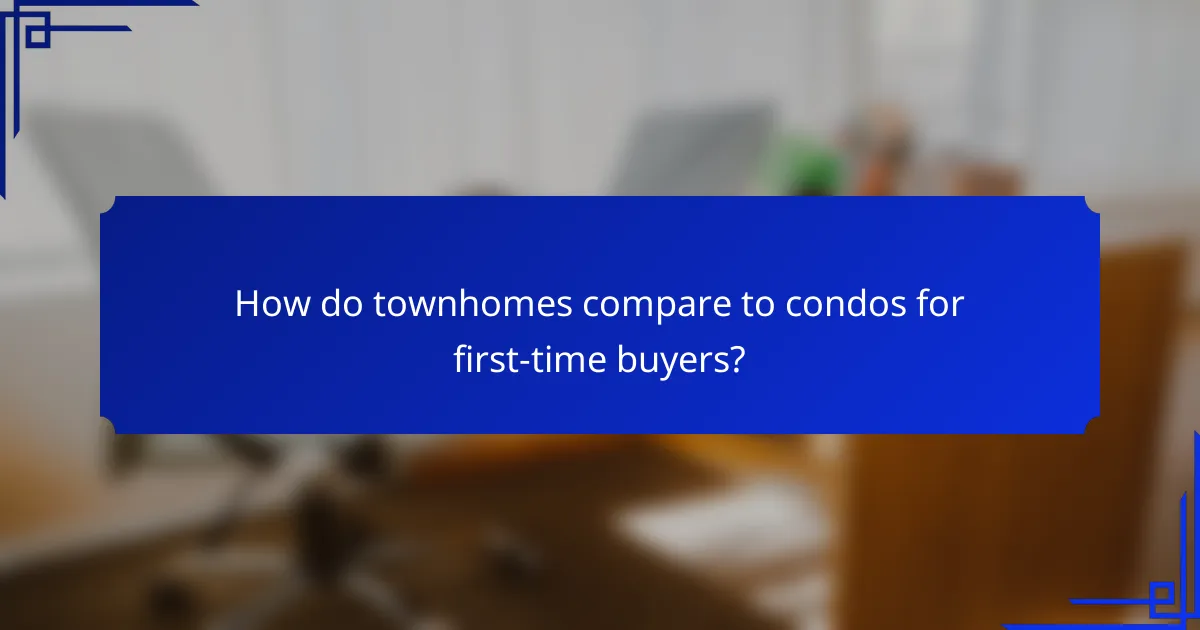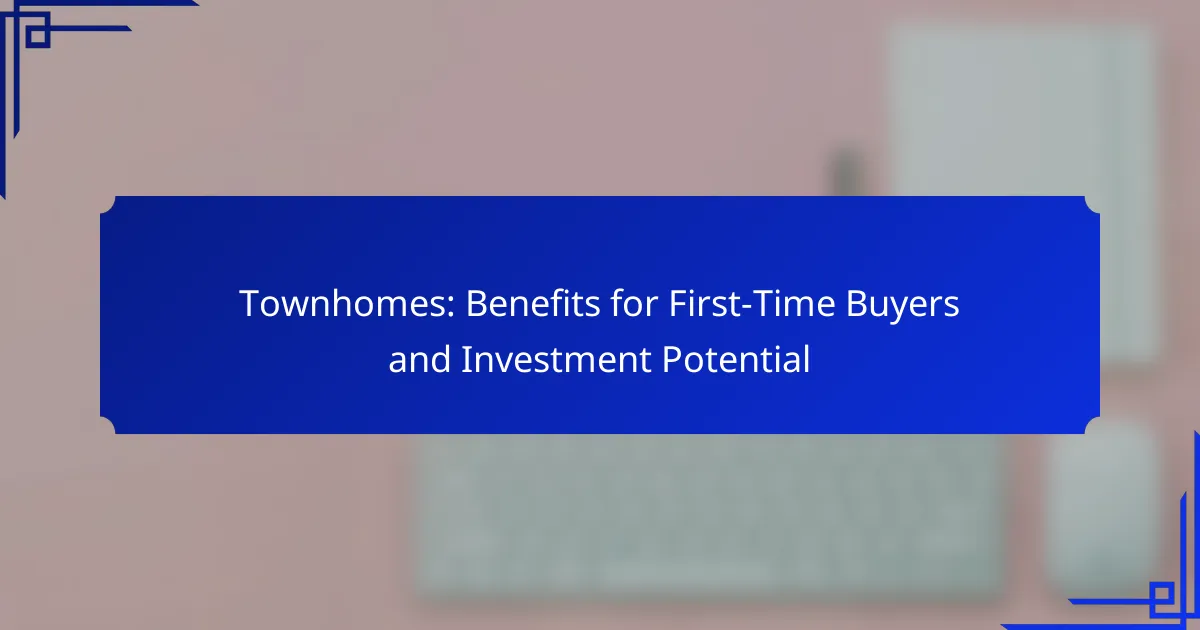Townhomes present an appealing option for first-time buyers due to their affordability, lower maintenance needs, and access to community amenities. With more ownership benefits and private outdoor spaces compared to condos, they offer a home-like feel that many seek. Additionally, various financing options are available, allowing buyers to find the best fit for their financial circumstances.

What are the benefits of townhomes for first-time buyers?
Townhomes offer several advantages for first-time buyers, including affordability, lower maintenance, and access to community amenities. These factors make them an attractive option for those entering the housing market.
Affordability compared to single-family homes
One of the primary benefits of townhomes is their affordability relative to single-family homes. Townhomes typically have lower purchase prices, which can make them more accessible for first-time buyers working with limited budgets.
In many markets, townhomes can cost anywhere from 10% to 30% less than comparable single-family homes. This price difference can significantly impact monthly mortgage payments and overall financial planning for new homeowners.
Lower maintenance responsibilities
Townhomes often come with reduced maintenance responsibilities compared to single-family homes. Many townhome communities include homeowners associations (HOAs) that handle exterior maintenance, landscaping, and common area upkeep.
This arrangement allows first-time buyers to focus on enjoying their new home rather than worrying about tasks like lawn care or roof repairs. However, it’s essential to consider HOA fees, which can vary widely and affect overall affordability.
Access to community amenities
Many townhome developments offer access to community amenities such as pools, fitness centers, and parks. These shared facilities can enhance the living experience and provide opportunities for social interaction among residents.
For first-time buyers, these amenities can add significant value without the added cost of maintaining similar facilities in a single-family home. It’s advisable to review the specific amenities offered and any associated fees before making a purchase decision.

How do townhomes compare to condos for first-time buyers?
Townhomes typically offer more ownership benefits and space compared to condos, making them a favorable choice for first-time buyers. While both options provide shared amenities, townhomes often come with private outdoor areas and a more traditional home-like feel.
Ownership structure differences
The ownership structure of townhomes differs significantly from that of condos. In a townhome, buyers own both the interior and exterior of the unit, including the land it sits on. In contrast, condo owners usually own only the interior space, while the exterior and common areas are collectively owned by all residents through a homeowners association (HOA).
This distinction can affect maintenance responsibilities and the level of control buyers have over their property. Townhome owners are typically responsible for their own landscaping and exterior upkeep, while condo owners may rely on the HOA for these services.
Cost implications
When considering costs, townhomes often have higher purchase prices than condos due to their larger size and land ownership. However, this can vary based on location and market conditions. First-time buyers should expect to pay additional costs for maintenance and property taxes associated with owning land.
On the other hand, condos usually have lower upfront costs but may come with monthly HOA fees that cover maintenance and amenities. It’s essential for buyers to factor in these ongoing costs when evaluating their budget and long-term financial commitments.

What financing options are available for townhome purchases?
First-time buyers can explore several financing options for townhome purchases, including conventional loans and FHA loans. Each option has its own requirements and benefits, making it essential to understand which aligns best with your financial situation.
Conventional loans
Conventional loans are traditional mortgage options not backed by the government. They typically require a higher credit score, often around 620 or above, and a down payment of at least 3% to 20%, depending on the lender’s criteria.
These loans may offer competitive interest rates and terms, making them attractive for buyers with strong credit histories. However, borrowers should be prepared for private mortgage insurance (PMI) if their down payment is less than 20%.
FHA loans
FHA loans are government-backed mortgages designed to help first-time buyers with lower credit scores and smaller down payments. Borrowers can qualify with a credit score as low as 580, and down payments can be as low as 3.5% of the purchase price.
These loans are beneficial for those who may struggle to save for a larger down payment, but they do come with mortgage insurance premiums that can increase overall costs. It’s crucial to weigh these factors when considering an FHA loan for a townhome purchase.

What is the investment potential of townhomes?
Townhomes offer significant investment potential due to their affordability, rental income opportunities, and appreciation trends, especially in urban settings. First-time buyers can benefit from lower purchase prices compared to single-family homes while enjoying the advantages of property ownership.
Rental income opportunities
Investing in townhomes can provide a steady stream of rental income, making them attractive for first-time buyers looking to enter the real estate market. With the growing demand for rental properties in urban areas, owners can often charge competitive rents, which may cover mortgage payments and generate additional cash flow.
When considering rental income, it’s essential to research local rental rates and vacancy trends. In many cities, townhome rents can range from a few hundred to several thousand dollars per month, depending on location and amenities. Understanding the local market can help you set appropriate rental prices and maximize your investment.
Appreciation trends in urban areas
Townhomes in urban areas often appreciate at a faster rate than other types of residential properties due to their desirable locations and lower supply. As cities expand and develop, townhomes typically benefit from increased demand, leading to potential value growth over time.
Investors should monitor local real estate trends and economic indicators, such as job growth and infrastructure development, which can influence property values. Historically, urban townhomes have seen appreciation rates in the low to mid-single digits annually, but this can vary widely based on specific neighborhoods and market conditions.

How do location and community affect townhome value?
Location and community significantly influence townhome value by impacting desirability and livability. Factors such as accessibility to amenities, quality of local schools, and community development plans can enhance or detract from property values.
Proximity to schools and public transport
Being close to reputable schools and public transport options can greatly increase a townhome’s value. Families often prioritize access to quality education, while easy transport links appeal to commuters, making these features attractive to potential buyers.
For example, townhomes located within a 10-15 minute walk from a good school or a major transit hub can see property values rise by a notable percentage compared to those further away. Always check local school ratings and public transport schedules to gauge potential value increases.
Neighborhood development plans
Future neighborhood development plans can significantly affect townhome values. Areas designated for new parks, shopping centers, or infrastructure improvements often see property values appreciate as the community evolves.
Researching local government proposals or community plans can provide insight into potential growth. Engaging with local real estate agents can also help identify neighborhoods poised for development, allowing first-time buyers to make informed investment decisions.

What factors should first-time buyers consider when choosing a townhome?
First-time buyers should consider several key factors when choosing a townhome, including location, budget, and community amenities. Understanding these elements can help buyers make informed decisions that align with their lifestyle and financial goals.
HOA fees and regulations
Homeowners Association (HOA) fees and regulations can significantly impact the overall cost of owning a townhome. These fees typically cover maintenance of common areas, landscaping, and amenities, and can range from low monthly amounts to several hundred dollars. Buyers should review the HOA rules to ensure they align with their preferences and lifestyle.
Additionally, some HOAs may impose restrictions on property modifications, landscaping, or even pet ownership. It’s essential to read the governing documents carefully and, if possible, speak with current residents to understand the community’s culture and regulations.
Future resale value
Considering the future resale value of a townhome is crucial for first-time buyers, as it affects long-term investment potential. Factors influencing resale value include location, market trends, and the overall condition of the property. Townhomes in desirable neighborhoods with good schools and amenities tend to appreciate more over time.
Buyers should also assess the townhome’s layout and features, as these can impact its appeal to future buyers. For instance, properties with modern finishes and energy-efficient appliances often attract higher offers. Consulting with a local real estate agent can provide insights into market conditions and help gauge potential resale value.
